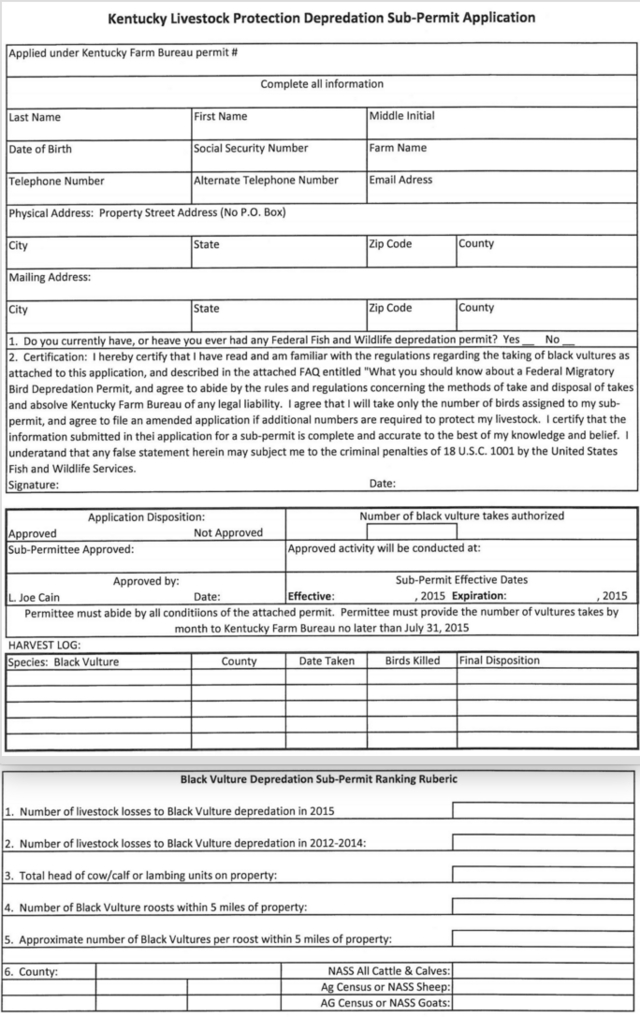| ||||||||||
Dr. Ronald P. Rogers CHIROPRACTOR Support for your body's natural healing capabilities 270-384-5554 Click here for details 


Columbia Gas Dept. GAS LEAK or GAS SMELL Contact Numbers 24 hrs/ 365 days 270-384-2006 or 9-1-1 Call before you dig Visit ColumbiaMagazine's Directory of Churches Addresses, times, phone numbers and more for churches in Adair County Find Great Stuff in ColumbiaMagazine's Classified Ads Antiques, Help Wanted, Autos, Real Estate, Legal Notices, More... 

|
Black Vulture depredation a priority for KY, US Farm Bureaus Last year, black vultures accounted for losses of 174 calves and 10 cows in Kentucky alone Click on headline for complete story By Joe Cain, Kentucky Farm Bureau Federation Forwarded by Nick Roy, Adair County Extension Agent Black vulture depredation on livestock has become a very serious issue in Kentucky. As you know, the black vulture, and turkey vulture, are protected under Federal law (The Migratory Bird Act), and international treaty (the Migratory Bird Treaty). Last year according to USDA APHIS Wildlife Services (WS), Kentucky livestock producers reported losses of 174 calves and 10 cows to black vulture depredation, up from 63 calves being reported killed the previous year. Up until now, the only legal option livestock producers had available to protect livestock from depredation was to apply for an individual black vulture depredation permit at the cost of $100, with a permit duration of one year. Kentucky Farm Bureau Federation (KFBF) voting delegates previously approved policy concerning black vulture depredation and last year the KFBF Board of Directors made addressing the issue of black vulture depredation a National Priority Issue. U.S. Fish and Wildlife Services (USFWS) and WS were at the 2014 KFBF Annual Meeting to address this serious issue, and USFWS also met with leaders during the 2015 Congressional Tour about the black vulture problem. Kentucky's Congressional delegation has been very active in pushing Federal agencies to address black vulture depredation, and hosted several meetings in Washington to seek ways we can legally protect livestock from black vulture depredation. Considerations included Federal legislation to delist vultures, regulation that would allow limited takes and modifying the depredation permit process. KFBF has been deeply involved in the entire process, talking regularly with USFWS and WS concerning the problems Kentucky producers are facing, and pushed for a solution that would be available to producers at no cost and allow them to legally protect their livestock from this predator. We are making progress. Last week USFWS approved a statewide depredation permit for KFBF. As far as I am aware, KFBF is the only non-government entity that has been approved by USFWS for a statewide depredation permit. The statewide permit does not provide for unlimited taking of black vultures, but affords producers experiencing depredation the opportunity to apply for a Livestock Protection Depredation Sub-Permit that allows legal "takes" of black vultures that are attacking livestock. The statewide depredation permit is limited to 350 total "takes" and will be administered by KFBF. The maximum number of takes a producer may be approved for is five (5). There is no cost to apply for the KFBF Livestock Protection Depredation Sub-Permit, but producers who have experienced extreme depredation and have large black vulture roosts nearby are encouraged to apply for an individual black vulture depredation permit with USFWS. The cost of an individual depredation permit is $100, but producers may be approved for a larger number of "takes" by USFWS. Producers interested in applying for the free KFBF Livestock Protection Depredation Sub-Permit may do so by completing the application form below this story and returning a signed copy to Kentucky Farm Bureau, Attn: Joe Cain, P.O. Box 20700, Louisville, Kentucky 40250-0700. This story was posted on 2016-02-08 13:44:36
Printable: this page is now automatically formatted for printing.
Have comments or corrections for this story? Use our contact form and let us know.
More articles from topic Farm and Garden:
Cooperative Dove Field Program enrollment now underway KY Ag Commissioner statement on Blue Grass Stockyards fire Vegetable disease seminar at Extension Center 21 Jan 2016 State Veterinarian issues restriction to protect KY poultry Time To Think About Gardening: ACGC meets 28 Jan 2016: KAFC approves loan for $250,000 to Green Co. recipient Seminar on computer farm record keeping 17 Dec 2015 Tony Rose reminds 4-H'ers of Country Ham Project deadline Beekeeping Basics Seminar will be Mon 21 Dec 2015 Cool Springs Creek Farm custom cattle equipage View even more articles in topic Farm and Garden |


|
||||||||
|
| ||||||||||
|
Quick Links to Popular Features
Looking for a story or picture? Try our Photo Archive or our Stories Archive for all the information that's appeared on ColumbiaMagazine.com. | ||||||||||
|
Contact us: Columbia Magazine and columbiamagazine.com are published by Linda Waggener and Pen Waggener, PO Box 906, Columbia, KY 42728. Please use our contact page, or send questions about technical issues with this site to webmaster@columbiamagazine.com. All logos and trademarks used on this site are property of their respective owners. All comments remain the property and responsibility of their posters, all articles and photos remain the property of their creators, and all the rest is copyright 1995-Present by Columbia Magazine. Privacy policy: use of this site requires no sharing of information. Voluntarily shared information may be published and made available to the public on this site and/or stored electronically. Anonymous submissions will be subject to additional verification. Cookies are not required to use our site. However, if you have cookies enabled in your web browser, some of our advertisers may use cookies for interest-based advertising across multiple domains. For more information about third-party advertising, visit the NAI web privacy site.
| ||||||||||





















































